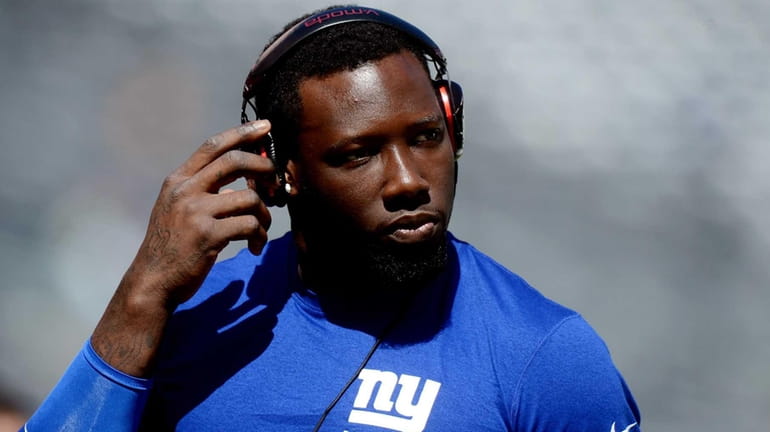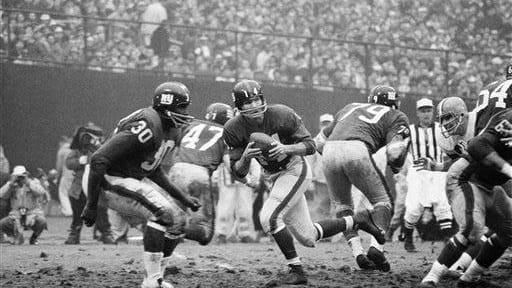Should Giants give underachieving Jason Pierre-Paul a sack of dough?

Defensive end Jason Pierre-Paul of the Giants warms up before a game against the Arizona Cardinals at MetLife Stadium on Sept. 14, 2014 in East Rutherford, N.J. Credit: Getty Images / Ron Antonelli
One of the Giants' biggest decisions this offseason is what to do with defensive end Jason Pierre-Paul, whose five-year rookie contract expires. For teammate Mathias Kiwanuka is concerned, it's a no-brainer.
"He's still in the prime of his career, he's a dominant force as a defensive end," Kiwanuka said Wednesday. "I think it would be foolish to let him walk out of this building."
But this question looms: Should the Giants potentially invest more than $100 million in the underperforming Pierre-Paul, who is now part of the NFL's bottom-ranked defense?
There is no easy answer, even if Kiwanuka believes the Giants would be making a horrendous mistake to let the 25-year-old pass rusher go as a free agent. Consider the ramifications of keeping him: Pierre-Paul is expected to command a contract similar to the ones signed by the NFL's top defensive ends in recent years, including the Texans' J.J. Watt and the Bills' Mario Williams, both of whom signed deals north of $100 million. Do you invest that kind of money in a player who has 31/2 sacks this season and has underperformed individually as much as the Giants' defense has underperformed collectively?
Or do the Giants move on without him, as they did last year with Hakeem Nicks, whose production declined sharply toward the end of his run in New York? And if they let him go, do they run the risk of Pierre-Paul going to one of the Giants' NFC East rivals like Dallas or Washington, both of whom will be in the market for pass rushers?
The Cowboys might be particularly interested in Pierre-Paul, since he has performed well in a number of games against them. And Washington owner Daniel Snyder has shown no hesitation in overpaying for defensive players, even underachieving ones.
Figuring out Pierre-Paul's worth can be a maddeningly difficult exercise. He showed exceptional promise his first two years, becoming a pass-rushing force toward the end of his rookie season and then having a breakout year in 2011 with 16½ sacks. The Giants won the Super Bowl that year, in part because of their consistently good pass rush.
Pierre-Paul was part of a defensive end rotation that also included Justin Tuck and Osi Umenyiora, both of whom are no longer with the team. Pierre-Paul's decline in production has been precipitous since 2011; in the last 21/2 seasons, he has 12 sacks in 36 games. His 2013 season was shortened by a shoulder problem that required surgery, but he has been almost fully healthy this year and is on pace for 61/2 sacks. Pierre-Paul has failed to get a sack in seven of the first nine games.
Pierre-Paul's 47 tackles put him third on the team behind linebackers Jacquian Williams and Jameel McClain.
In addition to his underwhelming numbers, Pierre-Paul has also committed his share of missteps with his penchant for speaking his mind, often to the detriment of the team. He predicted before the season the Giants would win the division. He said before a game against the Eagles that Philadelphia easily could have been 0-4, when they were actually 4-1. Last week, he suggested some teammates don't have heart. And on Sunday, after a loss to the Seahawks, Pierre-Paul was asked if the Giants had made proper adjustments in the locker room at halftime.
"I don't know," he said. "I was in the bathroom."
Pierre-Paul wasn't available to speak in the locker room on Wednesday, and the team is now limiting his availability to Fridays. That's a change from his normal Thursday availability, and it's believed to be an effort to keep a lid on Pierre-Paul's comments.
Even Kiwanuka believes Pierre-Paul "needs to learn how to handle the media better. He's just an honest person. He wears his heart on his sleeve. Everyone wants you to be honest and say what you're feeling, but the tendency in New York is to take things and focus on the negative. That's distracting to him and everyone around him. As an individual, the best thing for him is to learn how to manage being what he says in the media, because you're never going to get a fair shake."
Pierre-Paul can help himself by backing up his talk on the field, something that just hasn't happened through most of the season. There are seven games left for the Giants to make their final evaluation about Pierre-Paul's future.
As much as Kiwanuka thinks the only decision the Giants can make is to keep him long-term, the on-field results suggest it's no slam dunk about what should happen with Pierre-Paul. Even if the Giants decide he's worth the financial risk, it may be a case of throwing good money after bad. Especially if he can't justify a megabucks deal by stepping up his game the rest of the way.


